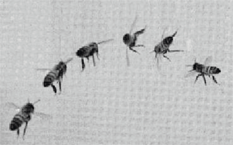Giving Robotic Flight More Buzz |
|
FOR IMMEDIATE RELEASE SPECIAL DEMONSTRATION CONTACT:
Researchers in a lab down the hall from the dean's office have situated the colony there so they have easy access to the bees. They are studying how the bees fly in order to enable micro air vehicles (MAV) to deal with unexpected wind changes. The MAVs someday could be used for search and rescue, defense and other applications.
To study the bees in flight, the researchers built a small-scale wind tunnel that subjects the insects to varying wind disturbances. The researchers film the bees using high-speed videography and slow down the resulting video, so they can observe the minutest changes in the bees' wing movements while compensating for wind gusts. “Insects fly in very dynamic and uncertain environments. By replicating these conditions in the lab, we can identify mechanisms that enable insects’ robust flight performance,” said Jason T. Vance, a biologist and post-doctoral researcher in the Autonomous Vehicle Laboratory (AVL) at the A. James Clark School of Engineering on the University of Maryland, College Park, campus. Vance said his team couples the data collected with aerodynamic modeling principles to determine what aspects of the bees' flight can be used in the MAVs. Assistant Professor Sean Humbert (Department of Aerospace Engineering and Institute for Systems Research) runs the AVL. He is one of several researchers who last week won a Multidisciplinary University Research Initiatives award from the U.S. Department of Defense for research titled "Animal Inspired Robust Flight with Outer and Inner Loop Strategies." The research is being led by the University of Washington. The Clark School's portion of the grant is $1.48 million. Vance and Humbert are collaborating with biologists, engineers, and other researchers in academia and the private sector to enable tiny flying robots to fly effectively in varying wind conditions. These robots eventually could be used to help gain situational awareness in dangerous and uncertain environments, such as those encountered on the battlefield or during natural disasters. "It's a very integrative and multi-disciplinary approach for studying this principle," Vance said. Engineers at the Glenn L. Martin Wind Tunnel on the College Park campus helped the AVL team fabricate the small-scale wind tunnel used to study the bees, which are on loan from the UM Department of Entomology. More Information: About the A. James Clark School of Engineering The Clark School's graduate programs are collectively the fastest rising in the nation. In U.S. News & World Report's annual rating of graduate programs, the school is 22nd among public and private programs nationally, 10th among public programs nationally and first among public programs in the mid-Atlantic region. The School offers 13 graduate programs and 12 undergraduate programs, including degree and certification programs tailored for working professionals. The school is home to one of the most vibrant research programs in the country. With major emphasis in key areas such as communications and networking, nanotechnology, bioengineering, reliability engineering, project management, intelligent transportation systems and space robotics, as well as electronic packaging and smart small systems and materials, the Clark School is leading the way toward the next generations of engineering advances. Visit the Clark School homepage at www.eng.umd.edu.
|
|
||||||||||||||||||



